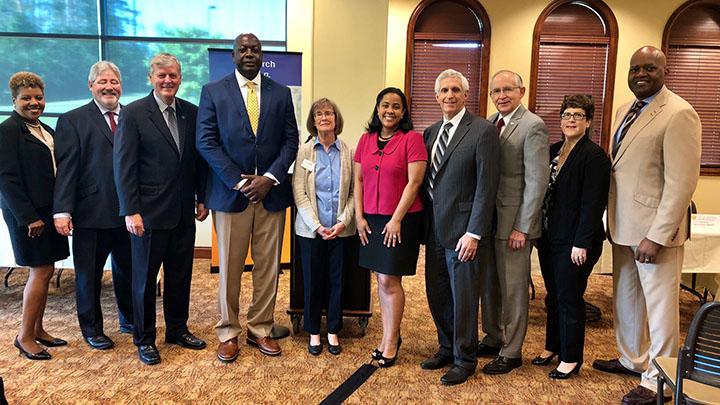Calvin collaborating to promote diversity in health care professions

Calvin College is collaborating with the Grand Rapids African American Health Institute (GRAAHI) and six west Michigan colleges and universities to create “Pathways to Careers in Healthcare” for area students of color.
On Thursday, June 28, 2018, GRAAHI executive director Shannon Wilson announced the launching of this nationally unprecedented engagement among colleges and universities during a press conference held at the Kent ISD Conference Center in Grand Rapids, Michigan. The project, initiated by GRAAHI, is funded through a $400,000 planning grant from the W.K. Kellogg Foundation of Battle Creek, Michigan.
“This is by far the most influential grant we have received. It has the potential to change how medical care is delivered in Grand Rapids, and by whom,” said Shannon Wilson, executive director of GRAAHI. “We can reduce disparities in health care when our health care workforce mirrors the diversity of our community.”
Collaborating for change
Calvin College, Aquinas College, Davenport University, Ferris State University, Grand Rapids Community College, Grand Valley State University, and Hope College, will each participate in the study with the goal of developing “college-specific” plans of action to engage students of color in reducing barriers to choosing study in health care professions.
“We are delighted to be in collaboration with these other institutions. The work that is before us is work that no one institution can do well on its own,” said Cheryl Brandsen, provost of Calvin College, in her remarks on Thursday. “Collaboration between these seven institutions will strengthen West Michigan, bring more people to the region, bring more talent to the region, and ultimately improve the utilization of health services and health outcomes for our minority communities.”
GRAAHI leaders say the project’s overarching goals are to have diversity in health care professions reflect diversity in the community by 2040, to establish a cadre of African American and Latinx health care leaders in West Michigan, and to initiate early exposure to advance health care practice careers throughout the K-12 experience.
Empowering leaders
Brandsen sees Calvin College as a natural partner in achieving these goals, noting, that as she was giving her remarks, 50 students were on campus participating in H.E.A.L.T.H. (Health, Education, and Leadership Training for a Hopeful Future) —a free camp for girls between 9 and 15 years old that promotes the culture of health, educates them about their bodies, broadens their vision of future healthcare professions, and helps them ponder where God might be calling them.
“This project [Pathways to Careers in Healthcare] is a concrete manifestation of our mission—it aligns well with our current strategic plan and it also aligns very well with our vision that we just approved for 2030, which, among other things, points to our desire that the outcomes of a Calvin education are not private resources for students but are outcomes that promote the flourishing of our cities and serve the people who live and work in them.”
Promoting flourishing
“Creating an equitable pipeline to employment, education, and health care is essential to improving the lives and futures of children in our communities - particularly children of color,” said La June Montgomery Tabron, president and CEO of W.K. Kellogg Foundation. “This kind of active partnership and collaboration involving so many local institutions holds the potential for engaging and preparing a health care workforce of the future, one that reflects the community it serves."
“The W.K. Kellogg Foundation grant funds a collaborative approach with our local colleges to study how we can reduce barriers limiting students of color from gaining employment in health care. We applaud the engagement of our seven area colleges and universities. No other community in the country is undertaking such a partnership with colleges and universities to create new pathways to careers in health care for students of color,” said Wilson.
“I think we have an opportunity of creating a best practice around addressing this issue that can be noted across the nation,” said Paul Doyle, board chair of GRAAHI.






